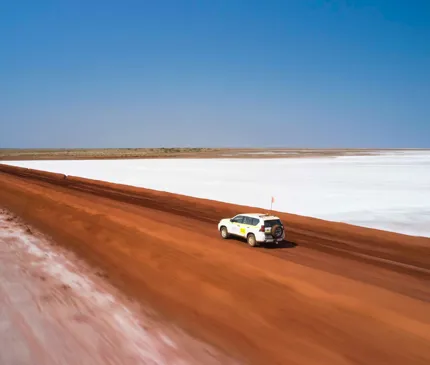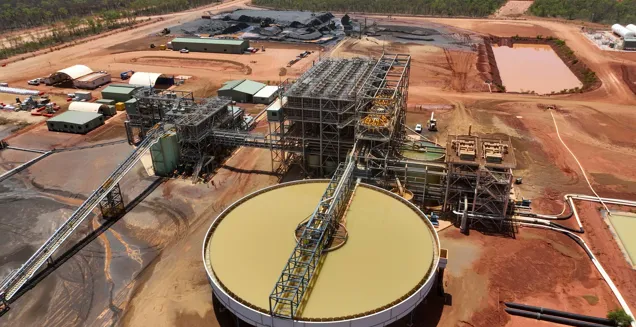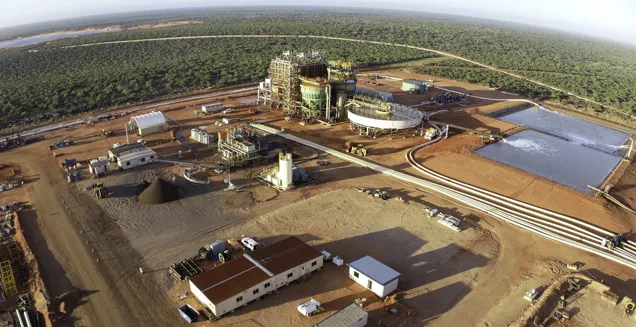Mardie Salt Project
Explore how NAIF's investment of up to $490 million is supporting the BCI Minerals Mardie Salt Project in the Pilbara region.
December 2020
Resources
Pilbara region, WA

Supported by a loan of up to $490 million from the Northern Australia Infrastructure Facility (NAIF), the Mardie Salt Project is a major development in the Pilbara region of Western Australia that aims to produce and export high-quality salt from seawater using solar and wind energy. The project will have significant economic and environmental benefits for the northern Australian region over its 60+ year operating life.
About BCI Minerals
BCI Minerals Limited is an Australian-based mineral resources company that is developing an industrial minerals business, with salt and potash as its initial focus.
BCI is rapidly progressing its 100% owned Mardie Salt Project, which is located on the Pilbara coast in the centre of Western Australia's key salt production region.
Project Overview
The Mardie Salt Project involves construction of large ponds and crystallisers over a 100 km2 area, two process plants, and a new port facility for export of salt and other products.
A new trans-shipment port within the Pilbara Ports Authority’s Cape Preston West Port area will enable exports from the Mardie Salt Project and will be available to other developments in the region.
The project aims to export 5.3 million tonnes per annum of high-purity salt via solar evaporation of seawater and a production process driven mainly by solar and wind energy.
The Mardie Salt Project will be the first major salt operation developed in Australia in two decades.
The proposed facilities will provide the opportunity to expand Australia’s chemical and agriculture industries over a 60-plus year operating life.
How We Helped
NAIF approved an initial loan in December 2020 and subsequently increased its commitment by $40 million in 2021, bringing total support to $490 million for BCI Minerals’ Mardie Salt Project in Western Australia. This concessional finance, with longer tenor and flexible terms, provided a cornerstone investment that represents a significant share of the project’s total funding requirement.
Our early support helped attract additional debt and equity investment by strengthening confidence in the project’s financial structure and providing finance aligned with the long-term nature of salt and potash infrastructure.
This has been a key step in BCI Minerals’ funding strategy, enabling the Mardie Salt Project to advance and secure the additional investment needed for new large-scale salt production capacity in Western Australia.
Public Benefit
An independent economic analysis has forecast benefits of more than $3.6 billion to the northern Australia region over Mardie’s construction and operating life.
The Mardie Salt Project will have a peak construction workforce of at least 476 people and an operating workforce of 697 people. It will also create additional indirect employment in the Pilbara region. BCI will seek to maximise local and Indigenous employment and contracting opportunities.
We are pleased to receive conditional NAIF Board approval for a large and long tenor loan. This loan is the largest NAIF allocation to a WA-based company to date and recognises the potential long-term benefits that Mardie will bring to the region, including new port infrastructure available to third-party users. Importantly, the loan also provides significant momentum for BCI to secure the remaining debt and equity funding components required for Mardie’s development.
Alwyn Vorster
Former BCI Managing Director
Related Links
Indigenous Engagement
- The Yaburara and Mardudhunera people
The Mardudhunera and Yaburara peoples are the Traditional Owners of the Mardie Salt Project area in the Pilbara region, with deep-rooted cultural, spiritual, and environmental connections to both land and sea country, including areas such as the Fortescue River and Murujuga. Caring for country remains a priority, particularly around vital ecosystems such as permanent river pools and culturally significant sites. The Wirrawandi Aboriginal Corporation (WAC), established in 2018 and based in Karratha, represents Yaburara and Mardudhunera Native Title holders and plays a key role in protecting cultural heritage and managing country through initiatives such as the Wirrawandi Rangers.
Indigenous Engagement Strategy Commitments
- Committed to increasing First Nations workforce, aiming for a minimum of 5% Indigenous employment in the first year of construction, 7.5% in the second year, and 10% in the third year. The company will strive to maintain at least 10% First Nations employment during ongoing operations.
- In partnership with the Wirrawandi Aboriginal Corporation and the Robe River Kuruma Aboriginal Corporation, BCI will develop an Aboriginal Procurement and Contracting Policy. This policy will include initiatives such as designing smaller, more accessible work packages, incorporating non-price evaluation criteria to support First Nations participation, and implementing other measures to enhance opportunities for local First Nations businesses.
- BCI is committed to supporting and celebrating Yaburara and Mardudhunera culture, including through co-developing cultural protocols, creating cultural heritage management plans to safeguard significant sites and values, establishing an Indigenous staff network, and actively participating in and hosting local First Nations community events.
Indigenous Engagement Strategy Outcomes
- In 2025, BCI reported that they have exceeded early construction First Nations employment targets by achieving 14% in the first two years. Employment opportunities arise as the project progresses with half the ponds operational and ongoing construction expected to be complete by the end of 2026. Procurement outcomes are evident, with contracts awarded to 12 Aboriginal entities totalling over $6m in the first reporting period and more than $15m in the 2024/25 financial year. Approximately 80% of the project workforce, including BCI staff and suppliers, have completed cultural competency training with plans to expand training frequency and continue monitoring participation.


